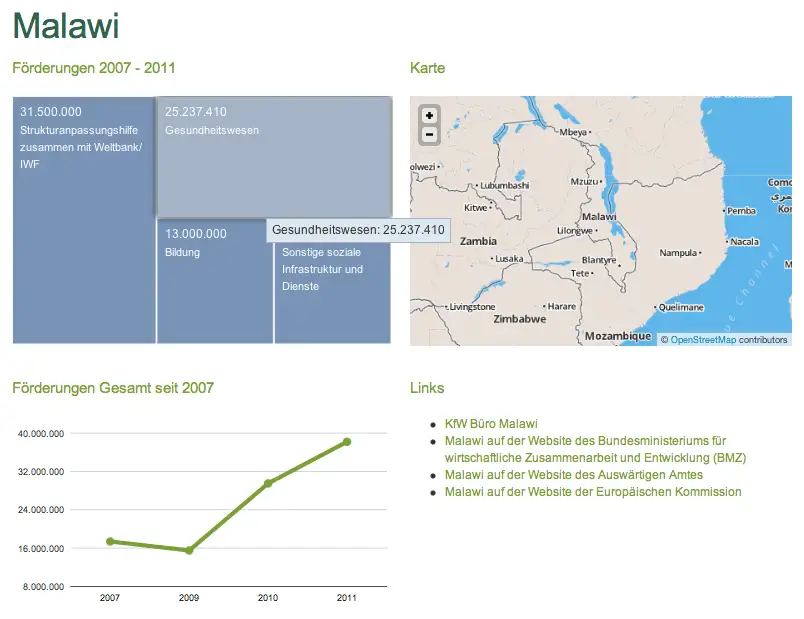Transparency Portal KfW Development Bank

Organisations working in development cooperation generally have nice websites with descriptions of projects and plenty of texts on big issues. But when it comes to talking about money, most websites put the topic on the back burner. KfW Entwicklungsbank (KfW Development Bank) wanted to change this, and through my engagement at the Open Knowledge Foundation Germany (OKF), I helped to implemente their new transparency portal (Disclaimer: I am in the board of OKF GER).
We had already been working with KfW on their funding report for Germany, and as a result we were approached by KfW-Entwicklungsbank, who wanted to know if we could present their aid data in a new way. At that time we were already working on offene-Entwicklungshilfe.de and were pleased to be able to extend that approach to more data sets.
Transpareny portal
Recently the transparency portal (transparenz.kfw-entwicklungsbank.de) went live online: There we present data from KfW-Entwicklungsbank from a number of angles. Alongside the typical financial data, the results of project evaluations are also shown in a school grade format. This year we should also be adding an exhaustive data bank, and we hope that this will be just the beginning of a fuller disclosure of data.
The data which have now been made available can also be downloaded in machine-readable form. Fortunately we were also able to persuade KfW to use OpenStreetMap geodata and maps. We have also integrated World Bank indicators for each country. It is precisely this combination of data sets in real time that will really set the ball rolling.
A start has been made
But it’s quite clear that the data sets are only a start. A further step is publication of data on open contracting: a conference took place on this recently between the Deutsche Gesellschaft für Internationale Zusammenarbeit (GIZ) and the World Bank. It is precisely in contracting that greater transparency is called for, as there are frequent cases of corruption in this area. Data on this subject have recently been published by the World Bank, and they paved the way for some interesting analyses.
Interview
KfW: The criticism has been raised that transparency only benefits non-governmental organisations and IT specialists. So how do poor countries gain from more transparency?
Kreutz: It is precisely the administrations in developing countries that derive enormous benefit from it. Officials on the ground are faced with such a flood of project proposals that they quickly lose any overview. If we in donor countries can save them work by presenting them with data sets prepared to international standards, it becomes much easier for them to build these into their analysis tools and to control and distribute cash flows. It will pay for itself in hard cash!
KfW: Have developing countries even got the necessary infrastructure?
Kreutz: The greatest innovations in the internet and telephone fields are taking place right there in emerging nations! East Africa was the first region in the world where it was possible to transfer money by mobile phone. Of course we need to enhance analysis capacities and make people over here and in the emerging nations aware of the value added. We’re only just beginning. Data are still highly aggregated. It gets really exciting once you can see how much the staff expenditure is, what the material costs are. Of course that’s also very political…
KfW: What do donor countries get from this new transparency?
Kreutz: The position at the moment is that there is no overview. Right now there is nowhere I can find out how many health projects there are in Tanzania. Transparency is knowing who is doing what, where and when. A uniform, worldwide organisational standard will enable donor institutions to refer far more quickly and easily to crucial data.
KfW: …you are talking about the International Aid Transparency Initiative (IATI) standard, which the German government has also signed up to….
Kreutz: Exactly. If it just takes one click of the mouse to compare data from the World Bank, USAID and other sources, whole new horizons open up. It also improves communication between the organisations themselves. And if we combine the project data with tenders and evaluations, things really start to hot up! And one day we might even be able to get an insight into organisations’ planning, without possibly having to acquire such knowledge through formal or informal channels. This would save expense and avoid corruption and insider dealing. We’re only just beginning and we can see huge potential.